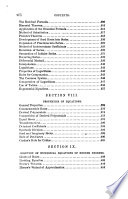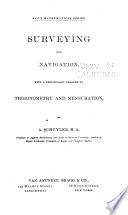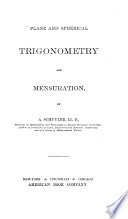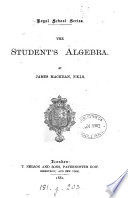 | Horatio Nelson Robinson - 1868 - 430 pages
...27". LOGARITHMS. 3O9. The Logarithm of a number is the exponent of the power to which a certain other number, called the base, must be raised, in order to produce the given number. Thus, in the expression, a*= I, the exponent, cc, is the logarithm of Ъ to the base a. An equation... | |
 | Aaron Schuyler - Measurement - 1864 - 506 pages
...V. LOGARITHMS. 1. Definition. A logarithm of a number is the exponent denoting the power to which a fixed number, called the base, must be raised in order to produce the given number. Thus, in the equation, b- = n, b is the base of the system, n is the number whose logarithm is to be... | |
 | Aaron Schuyler - Measurement - 1875 - 284 pages
...INTRODUCTION. LOGARITHMS. 1. Definition. A logarithm of a number is the exponent denoting the power to which a fixed number, called the base, must be raised in order to produce the given number. Thus, in the equation, b'=n, b is the base of the system, n is the number whose logarithm is to be... | |
 | Horatio Nelson Robinson - Algebra - 1875 - 430 pages
...43". LOGARITHMS. 399. The Logarithm of a number is the exponent of the power to which a certain other number, called the base, must be raised, in order to produce the given number. Thus, in the expression, a" = b, the exponent, x, is the logarithm of b to the base a. An equation... | |
 | James Mackean - 1881 - 510 pages
...EXPONENTIAL THEOREM. 249. The logarithm of a number is the exponent of the power to which a second number, called the base, must be raised in order to produce the first. Thus, if N = a", then x is the logarithm of the number N to the base a. This is usually written... | |
 | Henry Nathan Wheeler - Logarithms - 1882 - 60 pages
...86, 89. LOGARITHMS. § 1. The logarithm of a number N is the exponent denoting the power to which a fixed number called the base must be raised in order to produce N. Thus, if N= V, then is logb N= x ; or, in words, when the base is b the logarithm of N is x. Whatislog28?... | |
 | Emerson Elbridge White - Algebra - 1896 - 418 pages
...abc CHAPTER XX. LOGARITHMS. 580. The logarithm of a number is the exponent of the power to which a fixed number, called the base, must be raised in order to produce the given number. Thus, since 34 = 81, 4 is the logarithm of 81 to the base 3 ; since 8s = 512, 3 is the logarithm of... | |
 | W. H. F. Henry - Questions and answers - 1899 - 440 pages
...terms. 42. What is the Logarithm of a number f It is the exponent of the power to which a certain other number called the base, must be raised, in order to produce the given number. Thus, in the expression a1 = 6, the exponent x is the logarithm of b to the base a. A System of Logarithms... | |
 | James Harrington Boyd - Algebra - 1901 - 812 pages
...of a Logarithm. — The logarithm of a given number ix the exponent denoting the />uwer to which a fixed number called the base must be raised in order to produce the given number. EXAMPLE 1. Since 43 = 64, 3 is the logarithm of 64 to the base 4. EXAMPLE 2. Since 10'= 1(1, by définition... | |
 | William James Milne - Algebra - 1901 - 462 pages
...as a power of 10; 10 as a power of 10; 1 as a power of 10. 451. The exponent of the power to which a fixed number called the Base must be raised in order to produce a given number is called the Logarithm of the given number. When 10 is the base, the logarithm of 100... | |
| |